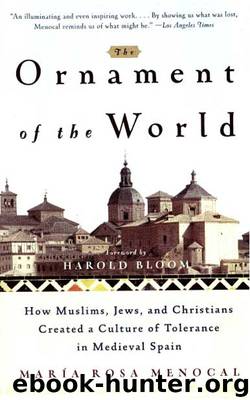The Ornament of the World by Maria Rosa Menocal

Author:Maria Rosa Menocal [MENOCAL, MARIA ROSA]
Language: eng
Format: epub, mobi
ISBN: 9780316092791
Publisher: Little, Brown and Company
Published: 2009-11-28T16:00:00+00:00
My heart is in the East, and I in the West,
asfar in the west as west can he!
How can I enjoy my food?
What flavor can it have for me?
How can I fulfill my vows
or do the things I’ve sworn to do,
while Zion is in Christian hands
and I am trapped in Arab lands?
Easily, I could leave behind
this Spain and all her luxuries!—
As easy to leave as dear the sight
of the Temples rubble would be to me.
Halevi was the last in the line of great Andalusian poets of the Golden Age, as it was dubbed by the nineteenth-century German Jews who became their historians and editors, men who saw in those urbane, philosophically mature, and socially successful Jews of the eleventh and twelfth centuries a winning reflection of what they wished the European Jews of the nineteenth to be. The golden Andalusian line that ended far from al-Andalus— symbolically trampled underfoot at the gates of Jerusalem—had begun with the self-styled David of his age, Samuel the Nagid; it was the line that had made writing in Hebrew a living thing once again, so that Halevi’s love songs to Jerusalem were not part of the fossilized liturgical Hebrew that was all Jews could chant before these Andalusians had come along.
The brilliance of the Golden Age came from Hebrew’s redemption from its profound exile, locked inside temples, never speaking about life itself. Maimonides, born in Cordoba just five years before Halevi left al-Andalus, described this post-exilic, pre-Andalusian state of things in his Laws on Prayer: “When anyone of them prayed in Hebrew, he was unable adequately to express his needs or recount the praises of God, without mixing Hebrew with other languages.” It was not that Jews should speak other languages but that the Hebrew they spoke was no longer the language of true love, of complex emotion, of seemingly contrary ideas and feelings: maternal, erotic, spiritual, material, transcendent. Maimonides, Andalusian that he was, believed that God needed and wanted to be spoken to in a language alive with that whole range of possible emotions. It was an attitude that later allowed English to find its voice in the love sonnets of Shakespeare as well as in the prayers of the King James Bible. The prayers prove more satisfying, perhaps even more true, for being in the language of the love songs.
Hebrew’s redemption had come at the hands of writers who were masters of Arabic rhetoric, the Andalusian Jews, men as thoroughly and successfully a part of the cult of Arabic grammar, rhetoric, and style as any of their Muslim neighbors and associates. A century before Halevi took his final leave to find Jerusalem, Samuel the Nagid had first made Hebrew perform all the magic tricks that his native tongue, Arabic, could and did. He had been made vizier because his skill in writing letters and court documents in Arabic surpassed that of all others. He then went on to write poems in the new Hebrew style, among them verses recounting his glories leading his taifa’s armies to victory.
Download
The Ornament of the World by Maria Rosa Menocal.mobi
This site does not store any files on its server. We only index and link to content provided by other sites. Please contact the content providers to delete copyright contents if any and email us, we'll remove relevant links or contents immediately.
| Haggadah | Hasidism |
| History | Holidays |
| Jewish Life | Kabbalah & Mysticism |
| Law | Movements |
| Prayerbooks | Sacred Writings |
| Sermons | Theology |
| Women & Judaism |
The Power of Habit by Charles Duhigg(3128)
Man's Search for Meaning by Viktor E. Frankl(2669)
Mckeown, Greg - Essentialism: The Disciplined Pursuit of Less by Mckeown Greg(2428)
MOSES THE EGYPTIAN by Jan Assmann(2411)
Devil, The by Almond Philip C(2324)
The Complete Dead Sea Scrolls in English (7th Edition) (Penguin Classics) by Geza Vermes(2274)
Unbound by Arlene Stein(2267)
I Capture the Castle by Dodie Smith(2034)
Schindler's Ark by Thomas Keneally(1878)
The Invisible Wall by Harry Bernstein(1799)
The Gnostic Gospel of St. Thomas by Tau Malachi(1788)
The Bible Doesn't Say That by Dr. Joel M. Hoffman(1676)
The Secret Doctrine of the Kabbalah by Leonora Leet(1601)
Political Theology by Carl Schmitt(1577)
The Jewish State by Theodor Herzl(1533)
A History of the Jews by Max I. Dimont(1529)
The Dead Sea Scrolls Bible by Martin G. Abegg(1511)
The Book of Separation by Tova Mirvis(1485)
Oy!: The Ultimate Book of Jewish Jokes by David Minkoff(1364)
